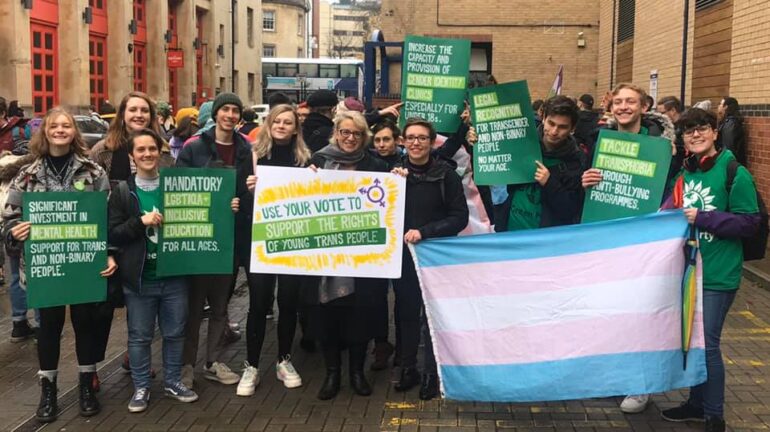Feminism: Invading a Gym Near You

Journalist and men’s rights activist Peter Lloyd is suing Kentish Town Sports Centre (warning: the article is hosted on an MRA website, which some readers may find offensive or upsetting) for offering women-only sessions in their gym and swimming pool. According to Lloyd, barring him from using the pool or gym at certain times, but charging him the same membership fee, is an infringement of his human rights comparable with the racial segregation laws enforced in some US states until the 1960s.
Even the most basic research into Peter Lloyd’s background shows that he’s a man with an agenda. He’s a campaigning journalist with a particular interest in men’s rights, he writes for blogs which advertise websites that publicly name and shame “bigots” (feminists) and “false accusers” (abuse survivors), and last year he accepted an award from the Anti-Feminism League. Suing his gym for the relatively common practice of offering women-only sessions sounds like either an overreaction or a publicity stunt, but if he wins his case it could force gyms across the country to start charging different membership rates for men and women. Since many sports facilities – particularly those run by or on behalf of local authorities – also offer some exercise classes which can only be attended by people over 60, or swimming sessions that are solely for parents with young children, will he be demanding further discounts for those who are young and child-free?
Lloyd claims that all men are being punished because of the minority who might ogle women in the gym, and that this is unfair to those men who can behave like decent human beings, but this shows a misunderstanding of why some women are reluctant to exercise in mixed company. Even if every male visitor behaved impeccably, there are some women would still feel uncomfortable being around men while exercising. Some women might have religious or cultural reasons for preferring to exercise in a single-sex environment, but many will simply be afraid of the silent judgements that men will pass on their bodies.
Although Lloyd is correct in stating that some men also struggle with body image, it doesn’t compare to the level of socially sanctioned prejudice about women’s appearance. Whether it’s the Daily Mail’s sidebar of shame or comments from family members, co-workers and complete strangers, women’s bodies are constantly up for public discussion. Boob-size, bum-size, clothes, make-up, hairstyle (which is a particularly sensitive issue for black women), wrinkles, acne, cellulite, body hair – other people feel entitled to comment on all of them. And the worst part of it is that judgements on your appearance aren’t just about your appearance; they’re a reflection of your worth and status. In the eyes of society and the media, not meeting the approved beauty standards doesn’t just make you unattractive, it makes you a bad person.
As well as anxiety about their appearance, women also have to contend with society’s negative attitudes towards women taking part in sport. The competitiveness and athleticism are seen as undesirable in women; we’re supposed to be soft, weak, and passive. When the football referee Sian Massey started working at men’s Premier League matches in 2011, commentators questioned whether a woman was capable of running around at the edge of the pitch for a full 90 minutes. Pre-olympics profiles of athletes, such as the now-infamous Vogue photoshoot, went to great lengths to make the women appear glamorous and feminine by picturing them in bizarre costumes, and in most cases posing like fashion models (and there are rumours that some had their limbs airbrushed to minimise their muscles), while the men were shown training. While male athletes are praised to the point of objectification for their muscular physiques, visible muscles on women are seen as ugly, unfeminine, and even unnatural.
Societal pressures like these form a major barrier to many women’s participation in exercise, and since these attitudes aren’t going to disappear overnight, we need to have ways of mitigating their effect in the meantime. “Equality” doesn’t necessarily mean treating everyone exactly the same; some people need extra support to participate fully in society, even though others manage without help. Providing that support isn’t discrimination, it’s inclusion.



Feminists hate it when their own logic is used against them.
Peter Lloyd is 100% correct. He is paying for a membership he is not allowed to use for a sizeable portion of time during the year due to gender-specific classes.
This is a consumer rights issue and he should win the case. There’s nothing ‘vindictive’ about it.
Feminists only see problems that affect women. Case in point … they whine about FGM that’s illegal while MGM (circumcision) is legal and they won’t accept that MGM is just as damaging to men.
Feminists are irrational morons. I also find it hilarious that a feminist would defend muslims, when they follow the most ‘patriarchal’ ideology on the face of the planet. Feminism is always good for a laugh, if nothing else.
Hello. I am Peter Lloyd. I’m sorry that your responses are so aggressive and dismissive. Although you’re keen to paint me as the villain, all I actually want is to be treated fairly. I’m more than happy for the gym to have women-only times (and make this clear in my case) but I do object to paying for almost 400 hours I am not allowed to use. Anyone who disagrees is advocating for sexual discrimination.
This hadn’t occurred to me as something desirable until reading his article. He’s obviously a deranged woman-hater so yes, please bring on the safe, female only gym times, and female only gyms too.
I work in (and am a male member of) a leisure centre in Edinburgh which offers women-only sessions, and it had never occured to me that they might be perceived by some as discriminatory. The way I see it, both men and women were made fully aware of the package of services which would available to them if they joined up, and the male members each accepted that when they decided to do so. I think we’ve considered male-only sessions, but could never identify a demand for them.
However, as a law student I can see where this might get sticky. The same legal precedent which led the courts to penalise B&Bs which didn’t offer accommodation to gay couples on an equal basis (no discrimination against against protected classes in the provision of services to the public) might also force the lower courts to find in Lloyd’s favour even if the justices themselves think he’s being silly.
Lloyd is clearly just being vindictive, but he may well succeed in exploiting the way our anti-discrimination law is set up.
Gaynor – The swimming pool in my parents’ village live used to offer a men-only session to balance out the women-only session, but I think it might have stopped due to lack of demand. But as you say, this is probably just an attack on any provision for women.
@Adam: As much or more of the (explicit) judgement and commentary on women’s appearances comes from fellow women as from men. It’s just that the cultural context means that when they come from men, they come across as predatory rather than merely judgmental and rude.
I’ve actually seen some leisure centres offering male-only sessions too e.g. when I lived in East London. If he’s really interested in having ‘equality’ in this sense, why not just write to his leisure centre and ask for that? I think there are good reasons for such sessions, e.g. Muslim (and maybe orthodox Jewish?) men are actually not supposed to go around women (other than their wife obviously!) without body and head coverings, so a male only swimming session would probably be a very good idea, and I don’t know any women who’d complain about that. But this guy seems just to want to shut down anything which provides for women, rather than to genuinely support men who may have similar needs.
great stuff.
As a small aside, even in the small way that men might feel judged for our bodies (which as you say, is clearly less than women are), my memory of this (which is basically from when I was a teenager) is that it was always other men doing the judging – how strong/muscular/not fat each other were.
not really going anywhere with that, just an observation.
Thanks for writing this. I really feel as though I know so much more about this than I did before. Your blog really brought some things to light that I never would have thought about before reading it. You should conntiue this, Im sure most people would agree youve got a gift.